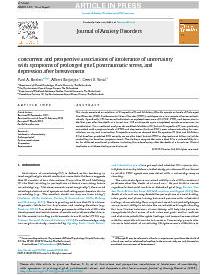Concurrent and prospective associations of intolerance of uncertainty with symptoms of prolonged grief, posttraumatic stress, and depression after bereavement.
Abstract
This study examined associations of Prospective IU and Inhibitory IU with symptom-levels of Prolonged Grief Disorder (PGD), Posttraumatic Stress-Disorder (PTSD), and depression in a sample of bereaved individuals. Specifically, 265 bereaved individuals completed measures of IU, PGD, PTSD, and depression in the first year after the death of a loved one; 134 participants again completed symptom-measures six months later. Cross-sectional analyses showed that Inhibitory IU (but not Prospective IU) was positively associated with symptom-levels of PTSD and depression (but not PGD), even when controlling for neuroticism, worry, and rumination. Prospective analyses showed that Prospective IU (but not Inhibitory IU) at baseline, predicted PGD severity six months later (but not PTSD or depression at follow-up) while controlling for baseline symptom-levels. The findings support the notion that IU is a vulnerability factor for different emotional problems, including those developing after the death of a loved one. Clinical implications of these findings are discussed.
Geachte bezoeker,
De informatie die u nu opvraagt, kan door psychotraumanet niet aan u worden getoond. Dit kan verschillende redenen hebben,
waarvan (bescherming van het) auteursrecht de meeste voorkomende is. Wanneer het mogelijk is om u door te verwijzen naar de bron
van deze informatie, dan ziet u hier onder een link naar die plek.
Als er geen link staat, kunt u contact opnemen met de bibliotheek,
die u verder op weg kan helpen.
Met vriendelijke groet,
Het psychotraumanet-team.
Reference:
Paul A. Boelen, Albert Reijntjes, & Geert E. Smid | 2016
In: Journal of anxiety disorders, ISSN 0887-6185 | 41 | juni | 65-72
http://www.sciencedirect.com/science/article/pii/S0887618516300330
In: Journal of anxiety disorders, ISSN 0887-6185 | 41 | juni | 65-72
http://www.sciencedirect.com/science/article/pii/S0887618516300330
Affiliation author(s):


